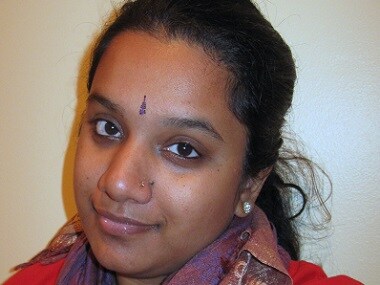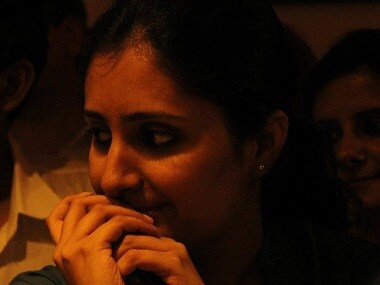40 Under 40: An Anthology of Post-Globalisation Poetry looks at the post-globalisation years through the eyes of 40 poets — all of whom are under that age as well — writing in English. It has been published by the Mumbai-based imprint Poetrywala. In order to get an idea about what to expect from the future, the anthology fittingly looks at our immediate past. Here are six poems from the book, recited by the poets themselves. …. The Difficulty with Mixing Two Languages Together by Mihir Vatsa [caption id=“attachment_2815352” align=“alignright” width=“380”]
 Mihir Vatsa[/caption] Unfortunately, there were no knights; but we could do with insurgents. I met one in a reverie. We sat under a banyan tree, and talked about remorse. A million raindrops lonely in a closet. He said he lived where it was a custom for the children to smoke coal-dust in joints. I wanted to stop him, Don’t go there, John! Don’t follow the traces of despair. When he left, I thought about the past; in its storehouse, the presence of three: columns in the end of Hindi periodicals encouraging pen friendship, English-medium textbooks on the desk, and six unsent letters, hidden together in a book, to the first English name. ………………………… Karma & WWF by Dion D’Souza Leaning against the table (one leg wobbly from a WWF-inspired stunt pulled by a burly boy upon his feeble classmate) the Marathi teacher, very fair, very Brahmin, said she did not believe in the afterlife: Everything is settled in the here and now. [caption id=“attachment_2815362” align=“alignleft” width=“380”]
Mihir Vatsa[/caption] Unfortunately, there were no knights; but we could do with insurgents. I met one in a reverie. We sat under a banyan tree, and talked about remorse. A million raindrops lonely in a closet. He said he lived where it was a custom for the children to smoke coal-dust in joints. I wanted to stop him, Don’t go there, John! Don’t follow the traces of despair. When he left, I thought about the past; in its storehouse, the presence of three: columns in the end of Hindi periodicals encouraging pen friendship, English-medium textbooks on the desk, and six unsent letters, hidden together in a book, to the first English name. ………………………… Karma & WWF by Dion D’Souza Leaning against the table (one leg wobbly from a WWF-inspired stunt pulled by a burly boy upon his feeble classmate) the Marathi teacher, very fair, very Brahmin, said she did not believe in the afterlife: Everything is settled in the here and now. [caption id=“attachment_2815362” align=“alignleft” width=“380”]
 Dion D’Souza[/caption] That still said nothing of who is keeping score. Who the anonymous, omnipresent referee, who, amid much cheering and clanking, announces the end of a round. And who heaves up the breathless winner’s arm upon thudding out the final count. Or are the tussles without referee? With us tumbling, free-falling into the fray, into the ring, with forces whose might we might only reckon with, each miscalculated move also an ingenious one, each wrong turn also sharply correct— with life as one long house of levelled mirrors. The wrestler and his hapless victim each marked time: the former, a little shaky, dreading the hour his handiwork would be discovered, the other, slammed down and now choking with emotion, awaiting that when the tables would be turned. The teacher stood, neck bare, arms bare, as usual, unsuspecting, yellow sari draped over her left shoulder, pale, somewhat frail, speaking plainly, softly. ………………………… Diced into Circle by Linda Ashok [caption id=“attachment_2815368” align=“alignright” width=“380”]
Dion D’Souza[/caption] That still said nothing of who is keeping score. Who the anonymous, omnipresent referee, who, amid much cheering and clanking, announces the end of a round. And who heaves up the breathless winner’s arm upon thudding out the final count. Or are the tussles without referee? With us tumbling, free-falling into the fray, into the ring, with forces whose might we might only reckon with, each miscalculated move also an ingenious one, each wrong turn also sharply correct— with life as one long house of levelled mirrors. The wrestler and his hapless victim each marked time: the former, a little shaky, dreading the hour his handiwork would be discovered, the other, slammed down and now choking with emotion, awaiting that when the tables would be turned. The teacher stood, neck bare, arms bare, as usual, unsuspecting, yellow sari draped over her left shoulder, pale, somewhat frail, speaking plainly, softly. ………………………… Diced into Circle by Linda Ashok [caption id=“attachment_2815368” align=“alignright” width=“380”]
 Linda Ashok[/caption] I was barely a teen. A happy face on mother as I stood confident in my first bra, perfect fit, floral, ready for the swim. Probably she wanted to freeze that moment, take a selfie and so, she and I entered a sketch box in the village fair. Faces placed side by side, cups too… I noted hers were celadon make, stapled with gold, and mine still aspiring for the potter’s hands. Today, the sound of a Like wakes me up with sugar in the eyes. I only doubt if it is father who calls nostalgia a stupid geometry, even when he’s circled in one. ………………………… Baba Yaga by Arjun Rajendran No one but my cousin found it funny, my story about two boys under the banyan tree being approached by a figure in white at an ungodly hour; the apparition, as it turned out, was Baba Yaga, asking if they’d like curd or tamarind rice? What’s [caption id=“attachment_2815372” align=“alignleft” width=“380”]
Linda Ashok[/caption] I was barely a teen. A happy face on mother as I stood confident in my first bra, perfect fit, floral, ready for the swim. Probably she wanted to freeze that moment, take a selfie and so, she and I entered a sketch box in the village fair. Faces placed side by side, cups too… I noted hers were celadon make, stapled with gold, and mine still aspiring for the potter’s hands. Today, the sound of a Like wakes me up with sugar in the eyes. I only doubt if it is father who calls nostalgia a stupid geometry, even when he’s circled in one. ………………………… Baba Yaga by Arjun Rajendran No one but my cousin found it funny, my story about two boys under the banyan tree being approached by a figure in white at an ungodly hour; the apparition, as it turned out, was Baba Yaga, asking if they’d like curd or tamarind rice? What’s [caption id=“attachment_2815372” align=“alignleft” width=“380”]
 Arjun Rajendran[/caption] to laugh at, those around pondered, confounded by our inside joke as we rolled on the floor, repeating the names of those Tamil dishes— Thayir Sadam. Puli Sadam— in a possessed tone, not caring how silly we looked. I’d repeat the joke every summer I met him, always creating the same effect, until a long silence-by then, we were taller, mature. I moved to another continent and like a returned bracelet, the witch became all mine to keep; she’d awaken after some rum, emerge from behind an Oak, push tiffin boxes under my nose; trembling, I’d bring a spoonful of rice to my mouth, hear her chuckle in my boyhood voice. ………………………… Flashback Sonnet: B-Film Actress Seeks Lost Bastard Child by Ranjani Murali You were conceived on a beach with flare lamps, fanfare, rubber horns, bus-halt screech, the hero with a penchant for number-plate [caption id=“attachment_2815386” align=“alignright” width=“380”]
Arjun Rajendran[/caption] to laugh at, those around pondered, confounded by our inside joke as we rolled on the floor, repeating the names of those Tamil dishes— Thayir Sadam. Puli Sadam— in a possessed tone, not caring how silly we looked. I’d repeat the joke every summer I met him, always creating the same effect, until a long silence-by then, we were taller, mature. I moved to another continent and like a returned bracelet, the witch became all mine to keep; she’d awaken after some rum, emerge from behind an Oak, push tiffin boxes under my nose; trembling, I’d bring a spoonful of rice to my mouth, hear her chuckle in my boyhood voice. ………………………… Flashback Sonnet: B-Film Actress Seeks Lost Bastard Child by Ranjani Murali You were conceived on a beach with flare lamps, fanfare, rubber horns, bus-halt screech, the hero with a penchant for number-plate [caption id=“attachment_2815386” align=“alignright” width=“380”]
 Ranjani Murali[/caption] watching, salt-rock, stiff nods from directors wiping necks with blue-checked handkerchiefs, disco-ball shard light dancing off haywards 5000s, sambrani plumes from nearby balconies, the clamor of sundal boys’ cycle bells and aluminum cans, and even a hunched man taking notes on suitable body angles. Start roll camera was not a cue for extending bare knee, it was a precise rupturing of polished prism by an eye of light flecked with raw silica—crystals wrenched from sheerness, coating the love-scene with an opacity that your fetal, forming eyes could have never known; you, a springing of cinematic effusions and silicate songs in the rain, perhaps now bridge-layer, cement-mixer, glass carver, perhaps master of straight edges or crenelle, or maybe just a construction worker passing by water, seeing through sand, as my skin did that day: an observation of pure refraction, gaze in glass. ………………………… Back in the orchard by Semeen Ali I bit into a green guava Hard as it was The seeds stuck between my teeth As much as I tried to remove them They held on Firmly [caption id=“attachment_2815336” align=“alignleft” width=“380”]
Ranjani Murali[/caption] watching, salt-rock, stiff nods from directors wiping necks with blue-checked handkerchiefs, disco-ball shard light dancing off haywards 5000s, sambrani plumes from nearby balconies, the clamor of sundal boys’ cycle bells and aluminum cans, and even a hunched man taking notes on suitable body angles. Start roll camera was not a cue for extending bare knee, it was a precise rupturing of polished prism by an eye of light flecked with raw silica—crystals wrenched from sheerness, coating the love-scene with an opacity that your fetal, forming eyes could have never known; you, a springing of cinematic effusions and silicate songs in the rain, perhaps now bridge-layer, cement-mixer, glass carver, perhaps master of straight edges or crenelle, or maybe just a construction worker passing by water, seeing through sand, as my skin did that day: an observation of pure refraction, gaze in glass. ………………………… Back in the orchard by Semeen Ali I bit into a green guava Hard as it was The seeds stuck between my teeth As much as I tried to remove them They held on Firmly [caption id=“attachment_2815336” align=“alignleft” width=“380”]
 Semeen Ali[/caption] I had bitten into my first green guava Amrud Amdud I had called it. I had tried to climb a guava tree In my mother’s home My home The peeling trunk had been of no help On afternoons that spoke to no one When people pretended to fall asleep A soft thud in the backyard And I the self-appointed policeman Rushing through long verandahs To shoo away the “ nasty children” Would pause to wake up someone What if I was out numbered? Evening would come softly The last song of the koel Sung while sitting on one of the branches The futile attempts to climb the guava tree. Another evening has arrived The tree is laden with guavas No appointed policemen required The house is slowly emptying itself The inhabitants disappearing No longer does a koel sing its song here I pluck a guava to take a bite It does not taste the way it always did.
Semeen Ali[/caption] I had bitten into my first green guava Amrud Amdud I had called it. I had tried to climb a guava tree In my mother’s home My home The peeling trunk had been of no help On afternoons that spoke to no one When people pretended to fall asleep A soft thud in the backyard And I the self-appointed policeman Rushing through long verandahs To shoo away the “ nasty children” Would pause to wake up someone What if I was out numbered? Evening would come softly The last song of the koel Sung while sitting on one of the branches The futile attempts to climb the guava tree. Another evening has arrived The tree is laden with guavas No appointed policemen required The house is slowly emptying itself The inhabitants disappearing No longer does a koel sing its song here I pluck a guava to take a bite It does not taste the way it always did.
Listen: From Mihir Vatsa to Linda Ashok, six poets under 40 recite their poems on post-globalisation
Manik Sharma
• June 4, 2016, 14:34:08 IST
40 Under 40: An Anthology of Post-Globalisation Poetry looks at the post-globalisation years through the eyes of 40 poets writing in English.
Advertisement
)
End of Article